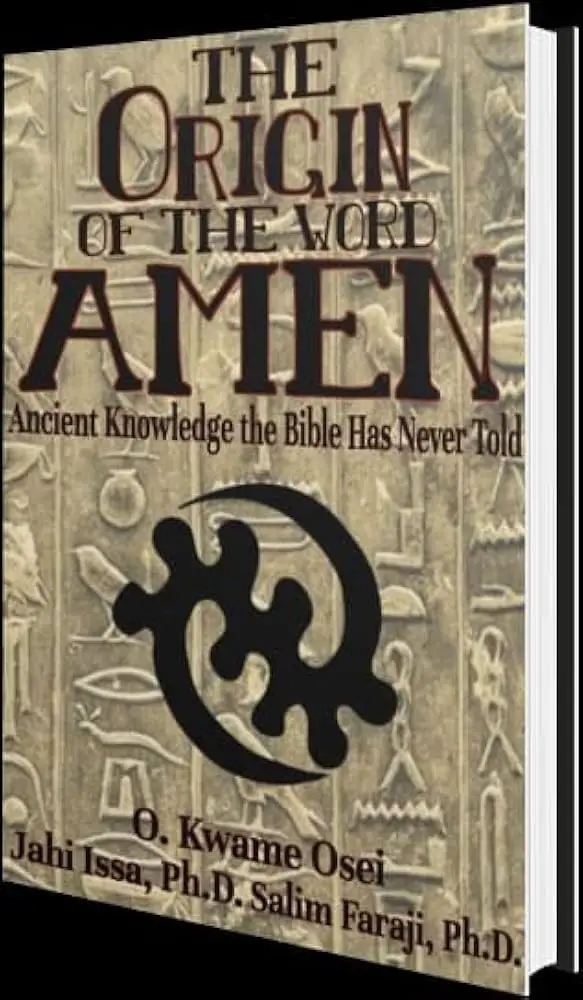The word “Amen” is derived from the old Semitic root, meaning “firm,” “fixed,” or “sure.” It has been incorporated into Greek, Latin, and English languages after first appearing in the Hebrew Bible.
Throughout history, “Amen” has been translated as “so be it,” “verily,” or “truly,” and carries the meaning of “certainty,” “truth,” and “verily. ” This ancient word is found in both the Old and New Testaments and is used to express strong affirmation or agreement at the end of a prayer or statement.
Its pronunciation can vary from [ ah-men ] to [ ey-men ], reflecting the diversity of its expression. The word’s roots point to truthfulness, stability, reliability, and trustworthiness, making it a powerful and meaningful conclusion to prayers and declarations.
Tracing The Linguistic Roots
The word “Amen” originates from a Semitic root, meaning “firm” or “sure. ” It has been incorporated into various languages, including Hebrew, Greek, Latin, and English, with translations such as “so be it,” “verily,” or “truly. ” The word signifies certainty, truth, and reliability in prayers and religious contexts.
The Semitic Language Family
The Semitic language family is a group of related languages that originated in the ancient Near East. This language family includes languages such as Hebrew, Arabic, Aramaic, and Amharic. These languages share common linguistic features and have influenced each other over time. Tracing the linguistic roots of the word “Amen” leads us to explore the primary source of the Semitic language family, which is Hebrew.Hebrew: The Primary Source
Hebrew is considered the primary source of the Semitic language family. It is an ancient language with a rich history dating back thousands of years. The word “Amen” has its origins in Hebrew and is found throughout the Hebrew Bible, known as the Old Testament in Christian traditions. In Hebrew, the word “Amen” is derived from the root word “āmēn,” which means “certainty,” “truth,” and “verily.” This root word conveys a sense of firmness, reliability, and trustworthiness. It reflects the idea of something being fixed or sure. The related Hebrew verb also means “to be reliable” and “to be trusted.” Tracing the linguistic roots of “Amen” reveals its journey across different languages and cultures. The word first appears in the Hebrew Bible and was eventually introduced and incorporated into Greek, Latin, and English languages. In the Greek Old Testament, “Amen” is usually translated as “so be it.” In the English Bible, it has frequently been rendered as “verily” or “truly.” The word has two primary pronunciations in English: [ah-men] or [ey-men]. However, it can be expressed in endless ways, from a soft whisper to a joyous shout. Common English translations of the word “Amen” include “verily,” “truly,” “it is true,” and “let it be so.” It is also used colloquially to express strong agreement or affirmation. Understanding the linguistic roots of “Amen” allows us to appreciate its significance in various religious and cultural contexts. It serves as a powerful word of affirmation, expressing certainty, truth, and agreement. The journey of this word across languages highlights its enduring impact and universal appeal.Amen In Ancient Scriptures
When it comes to the origin of the word “Amen,” its roots can be traced back to ancient scriptures. This powerful word has been used for centuries in various religious texts and holds deep meaning across different cultures and traditions. Let’s explore the first appearances of “Amen” in the Hebrew Bible and its usage in the Old and New Testaments.
First Appearances In The Hebrew Bible
The word “Amen” first appears in the Hebrew Bible, also known as the Tanakh, which is the sacred scripture of Judaism. In this context, “Amen” serves as an affirmation or agreement, expressing belief and trust in the words spoken. Derived from the Semitic root, the Hebrew verb associated with “Amen” signifies reliability and trustworthiness.
In the Hebrew Bible, “Amen” is frequently used at the end of prayers, blessings, and hymns. Its purpose is to affirm the truth and certainty of the words spoken, emphasizing the trustworthiness of the divine promises and the faithfulness of God.
Usage In Old And New Testaments
As time went on, “Amen” transcended the boundaries of the Hebrew Bible and found its way into other ancient scriptures, such as the Greek Septuagint and the New Testament. In these texts, it is often translated as “so be it” or “truly.”
The usage of “Amen” in the Old Testament is predominantly seen in the context of prayers, psalms, and prophetic utterances. It serves as a solemn affirmation and a sign of agreement with the words spoken by the prophets and the psalmists. It reflects the unwavering faith and trust in God’s promises and the acknowledgment of His sovereignty.
In the New Testament, “Amen” is primarily used by Jesus himself, emphasizing the truth and authority of His teachings. It is commonly found at the end of His statements, underscoring the certainty and validity of His words. The early Christian community also adopted the use of “Amen” as a response to prayers and as a way to express their agreement and faith in Christ.
Overall, the word “Amen” holds immense significance in ancient scriptures, representing certainty, truth, and trust. Its presence in religious texts across different cultures and traditions underscores its universal importance as a powerful affirmation of faith.
Amen Through The Ages
The word “Amen” has traversed through time and space, weaving its way through different languages and cultures, leaving a rich tapestry of historical significance. Its origins can be traced back to ancient Semitic roots, and as it journeyed through various civilizations, it evolved in pronunciation and meaning, yet retained its fundamental essence. Let’s delve into the fascinating journey of “Amen Through the Ages”.
From Hebrew To Greek
Originating from the Semitic root, the Hebrew word “Amen” signifies “firm,” “fixed,” or “sure,” reflecting reliability and trustworthiness. As it transitioned into the Greek Old Testament, “Amen” was commonly translated as “so be it,” capturing the essence of affirmation and agreement.
Latin And Beyond: The Spread To European Languages
With the expansion of civilizations, the word “Amen” transcended linguistic boundaries, making its way into Latin and subsequently integrating into European languages. This seamless assimilation allowed “Amen” to become a universal expression of certainty and truth, resonating across diverse cultures and beliefs.
Meanings And Connotations
The word “Amen” is commonly used in religious contexts as a way of expressing agreement or affirmation. However, its origins and meanings go beyond its common usage.
Certainty And Truth
The word “Amen” is derived from the Hebrew word “āmēn,” which means “certainty,” “truth,” and “verily.” This root meaning is reflected in the word’s usage in religious contexts, where it is often used as a declaration of belief in the truth of a statement or prayer. In this way, “Amen” serves as a way of expressing one’s faith and trust in a higher power.
Amen As An Affirmation
While “Amen” is primarily used as a way of expressing belief and trust, it can also be used as a simple affirmation or agreement. In this context, it serves as a way of indicating that one is in agreement with what has been said or prayed. It is a way of showing solidarity with others who share one’s beliefs and values.
Overall, the word “Amen” carries with it a sense of certainty, truth, and affirmation. Whether used in a religious context or simply as a way of expressing agreement, it serves as a powerful reminder of the values and beliefs that bind us together as human beings.
Pronunciation Evolution
The word “Amen” has its origin in the Semitic root, meaning “firm” or “sure. ” It is found in various translations of the Hebrew Bible and is often translated as “so be it” or “verily. ” The pronunciation of “Amen” can vary, from [ah-men] to [ey-men].
Pronunciation Evolution The word “Amen” has a rich history that dates back to ancient times. As the word traveled through different languages and cultures, its pronunciation and usage evolved. Let’s explore the different variations of “Amen” across different cultures and how its original pronunciation has changed over time. Original Pronunciations The original pronunciation of “Amen” is believed to have been “ah-mane” in ancient Hebrew. This pronunciation is still used in some Jewish communities today. In early Christianity, the word was pronounced “ah-men-ay” in Greek and “ah-men-ah” in Latin. Variations Across Cultures As the word spread across different cultures, its pronunciation and usage evolved. In Arabic, the word is pronounced “ameen” and is used as an affirmation of faith at the end of prayers. In Hinduism, the word “Amen” is also used, but with a slightly different meaning. It is used to invoke the blessings of the gods. In African American churches, the word “Amen” is often pronounced with a distinctive rhythm and emphasis. It is used as an expression of agreement or affirmation during sermons and prayers. Similarly, in gospel music, singers often use the word “Amen” to punctuate their lyrics and convey a sense of spiritual power and conviction. In modern English, the word is pronounced in two primary ways: “ah-men” and “ey-men.” The former is more common in British English, while the latter is more common in American English. However, “Amen” can be expressed in endless ways, from a soft whisper to a joyous shout. Conclusion The evolution of the pronunciation of “Amen” is a testament to the power of language and culture to shape our understanding of the world around us. From its ancient Hebrew roots to its modern usage in different religious and cultural contexts, the word “Amen” continues to be a powerful symbol of faith and affirmation.Amen In Cultural Practices
The word “Amen” has its origin in an old Semitic word, meaning “certainty,” “truth,” and “verily. ” It first appeared in the Hebrew Bible and was later incorporated into Greek, Latin, and English languages. The word reflects stability, reliability, and trustworthiness in its meaning.
Religious Ceremonies And Rituals
Amen is a word that has been used in religious ceremonies and rituals for centuries. It is often said at the end of prayers, as a way to affirm the words that have been spoken. In Christianity, it is commonly used to signal agreement with a statement or prayer. The word is also used in Judaism and Islam, as well as other religions around the world. In some religious traditions, Amen is believed to have a special power. It is thought that by saying Amen, a person is invoking the presence of God or a higher power. For this reason, it is often said with great reverence and sincerity.Colloquial Uses In Modern Times
While Amen has its roots in religious practice, it is also used in everyday conversation. In modern times, it is often used to signal agreement or approval, much like the phrase “I agree.” It is also used to express gratitude or appreciation, as in “Amen to that!” In some contexts, Amen has taken on a more lighthearted or ironic meaning. For example, it may be used sarcastically to indicate disbelief or skepticism. Despite its diverse uses, the word remains deeply rooted in its religious origins. Whether used in religious ceremonies or everyday conversation, Amen continues to hold a special place in our cultural practices. Its enduring popularity is a testament to the power of language to connect us to our past, present, and future.Misconceptions And Clarifications
The word “Amen” has its origins in an old Semitic word, meaning “certainty,” “truth,” and “verily. ” It first appeared in the Hebrew Bible and was later incorporated into Greek, Latin, and English languages. Its primary meanings include “truly,” “it is true,” and “let it be so.
“
Amen’s Alleged Egyptian Origins
There is a common misconception that the word “Amen” has its origins in ancient Egypt. However, historical evidence has shown that this is not the case. While the word “Amen” was used in ancient Egyptian religion, it had a different meaning and pronunciation than the word used in modern times.Debunking Myths With Historical Evidence
The word “Amen” is actually derived from an old Semitic root that means “firm” or “reliable”. The Hebrew verb derived from this root means “to be trusted” or “to be reliable”. The word was eventually introduced into Greek, Latin, and English languages, where it has been used as a declaration of affirmation or agreement. Some people believe that the word “Amen” was invented by the ancient Hebrews, but there is evidence that it was used in the cultures of the ancient Near East before the Hebrews. The word is also found in the Old and New Testaments of the Bible, where it is often used as a closing to a prayer or statement of belief. It is important to note that the word “Amen” can be pronounced in different ways, depending on the language and culture in which it is being used. In English, it is commonly pronounced as either “ah-men” or “ay-men”, while in Hebrew it is pronounced as “ah-mayn”. In conclusion, the word “Amen” has a long and complex history, but it is clear that it did not originate in ancient Egypt as some believe. Rather, it has its roots in the ancient Semitic languages and has been used as a declaration of affirmation and agreement for thousands of years.
Credit: www.umc.org
Amen’s Global Journey
The word “Amen” has a rich and fascinating global journey, with its origins deeply rooted in ancient Semitic languages and its influence extending across various religious traditions. This simple yet powerful word has transcended geographical and cultural boundaries, leaving an indelible mark on the global religious heritage and continuing to hold contemporary significance across different faiths.
Influence On Global Religious Heritage
The influence of “Amen” on the global religious heritage is profound and far-reaching. Originating from an old Semitic word, it first appeared in the Hebrew Bible before being adopted into Greek, Latin, and eventually English languages. The basic meaning of the Semitic root from which it is derived is “firm,” “fixed,” or “sure,” reflecting its role as a symbol of certainty and truth across diverse religious traditions.
Contemporary Significance Across Faiths
Across different faiths, the contemporary significance of “Amen” endures, serving as a unifying expression of affirmation and agreement in prayers, hymns, and religious rituals. Whether pronounced as [ah-men] or [ey-men], the word continues to be a universal declaration of truth and a solemn affirmation of belief, resonating with believers around the world regardless of their specific religious affiliations.
Conclusion: Amen’s Enduring Legacy
The word “Amen” has an enduring legacy, originating from an old Semitic word meaning “certainty,” “truth,” and “verily. ” It first appeared in the Hebrew Bible and was later adopted into Greek, Latin, and English languages. Its primary pronunciations include [ ah-men ] or [ ey-men ], and it carries various expressions in different contexts.
The Power Of A Single Word
Amen, a word that has transcended time and language barriers, holds a power that is unparalleled. Derived from the ancient Semitic root, its basic meaning is “firm,” “fixed,” or “sure.” In Hebrew, it signifies reliability and trustworthiness. Throughout history, this single word has been incorporated into various languages, including Greek, Latin, and English, and has been used to express affirmation, agreement, and the certainty of truth. Its enduring legacy lies in its ability to evoke a profound sense of conviction and belief in both religious and secular contexts.Amen’s Place In Future Generations
As we look towards the future, it is evident that the legacy of Amen will continue to thrive. Despite the ever-changing landscape of language and culture, this word remains deeply ingrained in the fabric of society. It has found its place not only in religious rituals and prayers but also in everyday conversations, affirmations, and expressions of agreement. Its universal appeal and timeless significance ensure that Amen will be passed down to future generations, transcending boundaries and uniting people in a shared understanding of faith, certainty, and truth. In conclusion, the word Amen has left an indelible mark on human history. Its origins in ancient Semitic roots, its incorporation into various languages, and its enduring significance in both religious and secular contexts all contribute to its enduring legacy. As we move forward, Amen will continue to hold its place as a powerful expression of affirmation, agreement, and unwavering belief. Let us embrace this word and the profound meaning it carries, knowing that its impact will be felt for generations to come.
Credit: www.todayifoundout.com

Credit: www.ebay.com
Frequently Asked Questions
What Does Amen Literally Mean?
The word “amen” is derived from a Semitic root meaning “firm,” “fixed,” or “sure. ” In Hebrew, it signifies “reliable” and “trusted,” and in the English Bible, it’s often translated as “verily” or “truly. “
Who Invented The Word Amen?
The word “amen” originated from an old Semitic word meaning “firm,” “fixed,” or “sure. ” It first appeared in the Hebrew Bible and later became incorporated into Greek, Latin, and English languages. In English, it can be pronounced as either [ah-men] or [ey-men].
Did Jesus Ever Say Amen?
Yes, Jesus did say “Amen” in the Bible.
How Was Amen Originally Pronounced?
The word “Amen” is derived from an old Semitic root, meaning “firm,” “fixed,” or “sure. ” In the Hebrew Bible, it is translated as “so be it. ” It has been incorporated into Greek, Latin, and English languages. There are two primary pronunciations: [ah-men] or [ey-men].
What Is The Literal Meaning Of The Word “amen”?
The basic meaning of the word “Amen” is “firm,” “fixed,” or “sure. ” It is derived from a Semitic root and signifies reliability and trustworthiness.
Conclusion
The word “Amen” originates from an old Semitic word, and its basic meaning is “firm,” “fixed,” or “sure. ” It has been incorporated into various languages, including Greek, Latin, and English, and is found throughout the Hebrew Bible and in both the Old and New Testaments.
The word signifies certainty, truth, and verily, and its pronunciation can vary widely.

